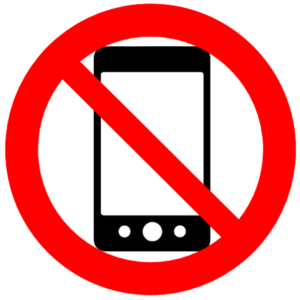 “Don’t show up at a meeting with me with your phone. If someone shows up with their phone, it’ll be their last meeting.”
“Don’t show up at a meeting with me with your phone. If someone shows up with their phone, it’ll be their last meeting.”
I think anyone who’s run a meeting and looked up to see almost all the participants’ heads down into their phone screens can identify with Jason Brown’s reaction above. According to John Simmons writing in The Wall Street Journal, Brown, who is the chief exec at Brown, Parker and DeMarinis Advertising, laid down the ultimatum two years ago.
He’s not alone in feeling that phones are a huge problem in the workplace.
“Two thousand six hundred seventeen times a day,” Simmons writes. “That is how often the average person taps, pokes, pinches or swipes their personal phone. It all adds up to about 2 hours and 25 minutes, according to a study by mobile app research firm Dscout Inc. And a good chunk of that time comes during work hours.”
And it’s not just disruptive during meetings, when we should be attentive and present for the people in the room. Just having your phone near you is enough to drop productivity and mental acuity.
“When workers in a recent study by the University of Texas and University of California had their personal phones placed on their desks—untouched—their cognitive performance was lower than when their devices were in another location, such as in a handbag or the pocket of a coat hanging near their workspace,” Simmons continues.
Think about your own day. How often do you keep that phone next to your computer, or in your pocket? How often does a notification distract you from being on task? And how often to you finally look up after those distractions and realize you are so far removed from what you ought to be working on and you have no idea how you got there?
Jason Brown isn’t the only business leader laying down the law. Mat Ishbia, CEO of United Wholesale Mortgage banned all tech from meetings, and now he’s piloting a new initiative.
“A group of about 250 workers are part of an experiment in which they refrain from all personal phone use at their desks,” Simmons writes. “If they want to use their devices they must go to a common area designated for phone use and socializing. Forty-five days into the trial run, workers are checking their phones a lot less, he said.”
It’s an interesting conundrum. Yes, smartphones, watches and laptops help us stay in touch and not miss that important call. And this instant communication certainly can help us get things done. But at what cost? What do we miss in real life when our attention is so distracted elsewhere?
Today I’m beginning an experiment. I just put my phone out of reach and out of sight. I want to see how my day goes and see if I am more focused and productive. I’ll also be curious to see what I “missed” by not having my phone at the ready. I suspect I already know the answer … and I bet you do too.
